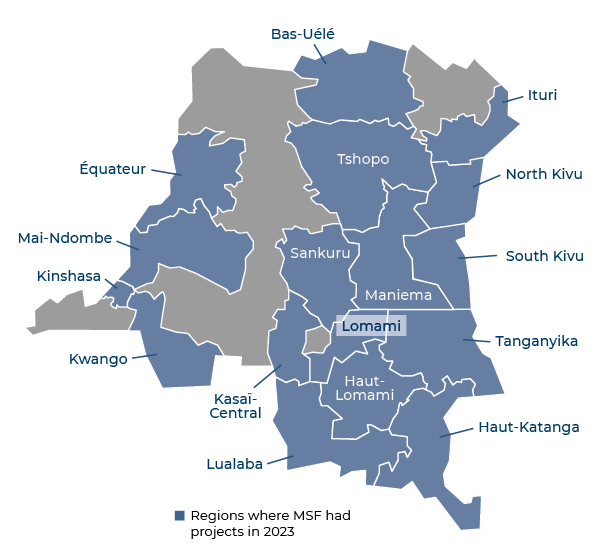MSF in action: Country profiles
KEY 2023 MEDICAL FIGURES
2,578,300
outpatient consultations
1,495,400
vaccinations against measles in response to an outbreak
29,000
people treated for sexual violence
Violence escalated in eastern Democratic Republic of Congo (DRC) in 2023, leaving 5.6 million people displaced by year’s end and making it one of the largest internal displacement crises in the world. Doctors Without Borders/Médecins Sans Frontières (MSF) increased activities to respond to the growing humanitarian needs and several health emergencies.
In North Kivu, intensified fighting between the M23 armed group and the Congolese armed forces led to repeated, forced displacement of people. MSF teams ran mobile clinics in several displacement sites providing people with clean water, sanitation facilities and medical care, including care for survivors of sexual violence. Some people sought safety in South Kivu, where MSF teams treated sick and injured people and improved hygiene facilities after a rise in cholera and measles cases.
In Ituri province, widespread, relentless attacks on civilians showed no respite in 2023. MSF maintained services in Rho camp in Drodro region and increased support to displacement sites by supplying clean water, sanitation facilities, distributing hygiene kits and increasing medical services. MSF continued supporting the general hospitals in Angumu and Bunia and launched a surgical project at Salama hospital with post-surgical services, including physiotherapy and mental healthcare.
In Tshopo and Mai-Ndombe provinces, emergency responses were launched, including providing general healthcare and running mobile clinics for people caught in land or inter-communal conflict. MSF teams also responded to people affected by floods and landslides in South Kivu.
There was also a rapid spread of measles, with nearly 300,000 cases registered and 6,000 deaths, partly due to deteriorating security in the east and vaccination setbacks. As a response, we undertook emergency vaccination campaigns across DRC to curb the spread of numerous diseases and responded to outbreaks of typhoid fever in Kwango province and mpox in Équateur province.
In Kinshasa, MSF launched a project for people with disabilities, focused on improving access to healthcare facilities, boosting hygiene in accommodation sites and working with the community to support the needs of people with disabilities.
